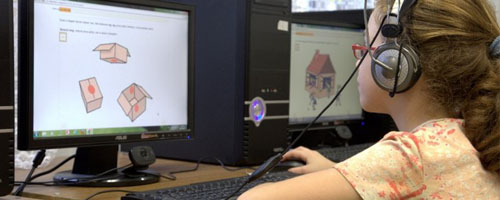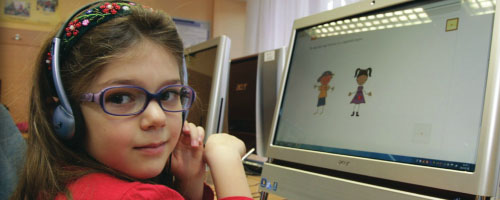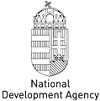Coordinator: Anikó Zsolnai
Research has shown that if school assessment focuses exclusively on particular domains of knowledge and skill, teachers tend to pay less attention to other, equally important, curricular elements; this results in the distortion of the original educational goals. It is essential that assessment programs consider and actively embrace a wide range of knowledge, skills and abilities. To this end, assessment in the following seven domains will be piloted in this project. The coordinators of these fi elds are indicated in parentheses.
English as foreign language (Marianne Nikolov). In Hungary, just as everywhere else in the world, the beginning of foreign language learning is being shifted to progressively younger ages. In the Hungarian context this phenomenon has been refl ected in the growing dominance of English, which is being learned from the age of six by an increasing number of students. This work explores the possibilities of systematic development and monitoring.
In Hungary, just as everywhere else in the world, the beginning of foreign language learning is being shifted to progressively younger ages. In the Hungarian context this phenomenon has been refl ected in the growing dominance of English, which is being learned from the age of six by an increasing number of students. This work explores the possibilities of systematic development and monitoring.
Visual skills (Andrea Kárpáti). In the 21st century the signifi cance of visual language has become equal to that of verbal expression. The promptness and sophisticated nature of visual judgment has become more important than ever before. Additionally, the relevance of the skills of emotionally loaded visual expression has increased in virtual reality. This work aims to elaborate instruments suitable for monitoring the development of some visual skills.
In the 21st century the signifi cance of visual language has become equal to that of verbal expression. The promptness and sophisticated nature of visual judgment has become more important than ever before. Additionally, the relevance of the skills of emotionally loaded visual expression has increased in virtual reality. This work aims to elaborate instruments suitable for monitoring the development of some visual skills.
Social skills (Anikó Zsolnai).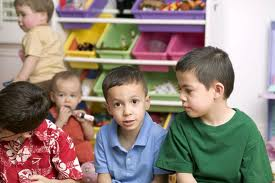 Previous studies have shown that the social skills and abilities of children might be successfully developed, even on the short run, by use of appropriate methods and suffi cient use of teaching and learning aids. The primary objective of this work is to explore the possibilities of diagnostic assessment for social skills and abilities in the age groups of 6–12.
Previous studies have shown that the social skills and abilities of children might be successfully developed, even on the short run, by use of appropriate methods and suffi cient use of teaching and learning aids. The primary objective of this work is to explore the possibilities of diagnostic assessment for social skills and abilities in the age groups of 6–12.
Civic education (László Kinyó). Active citizenship, defi ned as civic participation in the management of personal and public affairs, is considered to be a necessary skill set for the maintenance of modern democratic societies. The needs Coordinator: Anikó Zsolnai 8 of modern society in Hungary warrant a focus on the constituent components of civic education, identifi cation of the internal and external factors infl uencing the acquisition of civic knowledge in schools and, the development of agespecifi c instruments by which to measure and assess these factors.
Active citizenship, defi ned as civic participation in the management of personal and public affairs, is considered to be a necessary skill set for the maintenance of modern democratic societies. The needs Coordinator: Anikó Zsolnai 8 of modern society in Hungary warrant a focus on the constituent components of civic education, identifi cation of the internal and external factors infl uencing the acquisition of civic knowledge in schools and, the development of agespecifi c instruments by which to measure and assess these factors.
Motivation (Krisztián Józsa). Motivation is essential, not only for learning and the successful development of skills and abilities but for the acquisition of applicable knowledge. The mapping of student motivation combined with diagnostic exploration into motives for learning are necessary in understanding how to foster motivation. The objective of this work is twofold: to locate and adapt the most reliable international instruments for the measurement of motivation and to elaborate and test new instruments for the measurement of motives in reading, writing and counting.
Motivation is essential, not only for learning and the successful development of skills and abilities but for the acquisition of applicable knowledge. The mapping of student motivation combined with diagnostic exploration into motives for learning are necessary in understanding how to foster motivation. The objective of this work is twofold: to locate and adapt the most reliable international instruments for the measurement of motivation and to elaborate and test new instruments for the measurement of motives in reading, writing and counting.
Health literacy and health behavior (Erzsébet Antal and Katalin Barabás).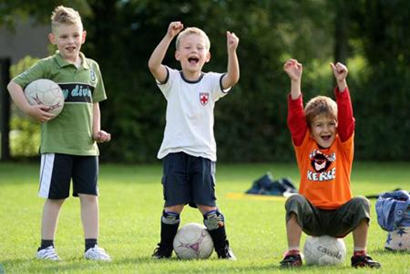 There is a fundamental need for the development of both individual health literacy and health behavior in modern societies. This requires the establishment and maintenance of a health culture, its conceptual knowledge, plus the basic skills which can be successfully applied in health-related situations and activities (context-specifi c literacy). This work undertakes to develop a theoretical framework upon which to construct and test suitable instruments for the assessment of Health Literacy and Health Behavior.
There is a fundamental need for the development of both individual health literacy and health behavior in modern societies. This requires the establishment and maintenance of a health culture, its conceptual knowledge, plus the basic skills which can be successfully applied in health-related situations and activities (context-specifi c literacy). This work undertakes to develop a theoretical framework upon which to construct and test suitable instruments for the assessment of Health Literacy and Health Behavior.
Learning to learn (Anita Habók).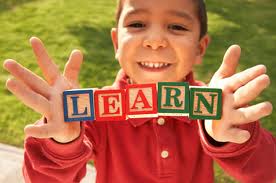 Successful participation in the knowledge-based societies of the 21st century requires that students not only be prepared for a world beyond school but also for lifelong learning. This expectation demands the acquisition of specifi c learning skills that are applicable outside of and beyond school and into adulthood. This work involves the processing and adaptation of existing international assessment projects, with special attention to the Finnish model, plus the construction and testing of new measurement instruments.
Successful participation in the knowledge-based societies of the 21st century requires that students not only be prepared for a world beyond school but also for lifelong learning. This expectation demands the acquisition of specifi c learning skills that are applicable outside of and beyond school and into adulthood. This work involves the processing and adaptation of existing international assessment projects, with special attention to the Finnish model, plus the construction and testing of new measurement instruments.






